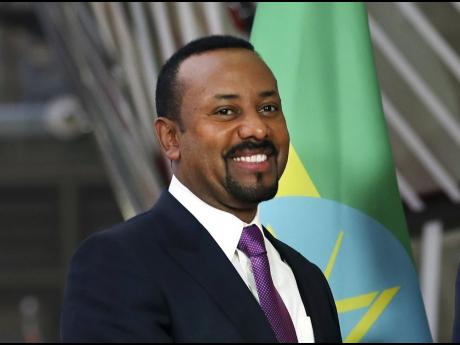David Salmon | Learning from Ethiopia's Nobel Peace Prize winner Abiy Ahmed Ali
Ethiopia's Prime Minister Abiy Ahmed Ali has become the 2019 recipient of the Nobel Peace Prize.The significance of this achievement should not be understated when exploring Prime Minister Ahmed's unique background, his idiosyncratic qualities, Ethiopia’s pre-existing social environment and the current quality of global leadership. His example of transformational leadership represents a beacon of hope for all countries, especially Jamaica, as there are numerous lessons we can learn from Africa’s current youngest head of government.
First and foremost, Mr Ahmed is Ethiopia’s first Oromo leader, an ethnicity at the centre of mass government protests for the previous three years. Disquiet over political, economic and social marginalisation eventually boiled over into violent protests that led to thousands being displaced, killed or injured. However, despite having the mandate, means and mechanisms to implement a social hegemony over the numerous smaller ethic groups, Mr Ahmed demonstrates a unique restraint uncommon to leaders of pluralistic societies.
The parallels to the Caribbean are evident. Ethiopia has often seen conflict among the country’s 80 ethnicities. Likewise, our region is not immune to its own internal conflict among rival ethnic groups as seen in Trinidad and Tobago and Guyana. Even more homogenous societies like Jamaica have seen their own divisions, centred around political parties, that have had deleterious effects on our economic and social advancement. Therefore, the remarkable discipline practised by Mr Ahmed is an example for Caribbean leaders to follow.
In the Caribbean, we have often seen a ruling party distribute the “spoils of government” accrued to it after a change in administration. This occurrence is quite common among societies that practice the “winner take all” Westminster style system as Gordon Robinson often points out. However, what makes Mr Ahmed’s example more noteworthy is his decision to embrace opposition parties through participatory democracy.
Consistently, the word 'compromise' is seen as anathema to the Jamaican political class and our governance system further facilitates a dogmatic decision-making process.
Nevertheless, Mr Ahmed’s denunciation of previous government human rights abuses, freeing of all of Ethiopia’s political dissidents and appointment of former government critics is historic for one of Africa’s most politically repressive governments. To put this in context, before Mr Ahmed’s elevation to office, Ethiopia’s widespread catalogue of state-sanctioned repression included allegations of extrajudicial killings, arbitrary arrests and the firing of live ammunition at protestors.
While Jamaica does not see this level of repression due to our political maturity, transparency is still an issue that the country faces in its administering of policy. As noted by Transparency International, since last year, Jamaica has fallen two places in the Corruption Perception Index to 70 out of 180 countries. Recent proposals, including the barring of Cabinet documents from public view for 70 years, do not arrest the perception of government corruption. Bold, decisive, concrete actions, like the ones implemented by Mr Ahmed provide the example for societies like Jamaica to follow.
Still, Prime Minister Ahmed's magnum opus is his successful resolution of the Eritrean–Ethiopian border conflict. Coming to office in April last year, Mr Ahmed successfully negotiated and signed a peace deal three months into his term that ended the 20-year military conflict following the 1998-2000 border war. Despite Jamaica’s sluggish economic growth and stalling of public sector reform, Mr Ahmed's quick resolution of such a long-standing issue highlights what can be achieved when different stakeholders commit to a course of action mutually beneficial to all groups involved.
While the domestic situation is by no means perfect in Ethiopia, and there are still significant hurdles the country faces, his leadership represents a breath of fresh air for the African continent.
To quote Mr Ahmed, “We have only one option and that is to be united, not only cooperating and helping each other but uniting in order to live together. The other option is to kill each other… . However, no sane person will opt for this. So, our option should be to trust one another, heal our wounds together and work together to develop our country.”
- David Salmon is a first-year public policy and management student at the University of the West Indies and a UNESCO youth ambassador. To send feedback, he may be contacted at davidsalmon@live.com

